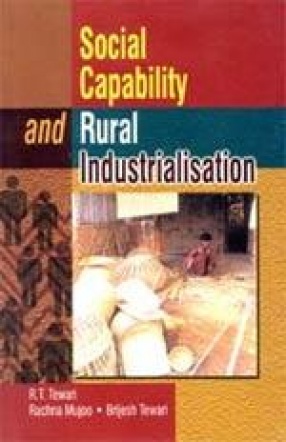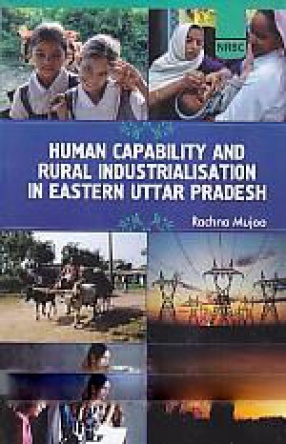Social Capability and Rural Industrialisation
Synopsis
As transpires from writings of Simon Kuznets, social capability plays a pivotal role in accelerated development of Less Developed Countries (LDCs). In its pursuance, the present study based on this novel theme endeavours primarily to assess and analyse the relative contribution of social capability to rural industrialization in the reorganized State of Uttar Pradesh. The study comes out with so many findings of crucial importance and only few ones strategically more meaningful are taken here for special mention. To begin with, it is seen that UP’s economy is passing through the phase of pre-mature tertiarisation and growth of income originating from the manufacturing sector shows sluggishness. Inspite, there has been a tendency of fast growing consumerism predominantly biased to major industry groups of food products, readymade garments, wood works, leather goods and metal products. But the deteriorating status with mounting sickness of SSIs calls for a detailed reviewing of the interest of the sector and invites radical change to stand upto the growing competitiveness through matching of State efforts with active involvement of the private sector. A majority of districts constituting the State are found to have been suffering from inadequacies of social, human and infrastructural capabilities, besides showing widening nature of set of prioritization based on their degree of deprivations is suggested for its enforcement at the micro-level with a view to not only minimizing the variance within and maximizing it between the regions but also reinforcing enhancement of social capability through out the State. Spatially, a skewed type of rural industrialization still continues to exist in the State with much larger (Western and Central) as compared to the backward ones (Easter and Bundelkhand). In sequel, as many as 40 out of the total 70 districts, which have their levels of rural industrialization below the State level average, are designated as industrially backward. Based on analysis of the coefficients arrived at through application of multiple regression models, the degree of urbanization-viz-a-viz other associated variables emerges as the most powerful explanatory variable for the observed variations in levels of rural industrialization. It would, therefore, be imperative to follow a two-pronged approach of ‘rural industrialization –via-urbanisation’ and a simultaneous development of rural settings for gearing up the tempo of rural industrialization in the State. The commercialization of agriculture (Com. AGR), in order of importance, comes to the next, followed by social capability. The coefficient of these two variables are, no doubt, positive but not significant. However, considering the further scope of its coverage and the growing demand for its raw material, Com. AGR. Deserves special priority in any strategy of agricultural development. Besides, while planning for bridging gaps in human development and infrastructure, an utmost care will be needed to ensure to only its adequacy but also its utilization through efficient delivery system. Finally, the performance of financed units in terms of value added per worker both at the State and the regional levels is found to be significantly higher than those of non-financed units. Hence, need of the hour is that Government should come forward to introduce some new monetary incentive schemes for modernization, diversification and technological advancement of small scale industries. Alternatively, to eliminate the on-going discriminatory treatment, the existing monetary incentive schemes of KVI can also be considered for their extension to SSI sector. Thus, it is hoped that the book will be of immense use to policy makers, planners and researchers including management experts.
Read more
36.00
32.4
$
40.00 $
Free delivery Wolrdwidе in 10-18 days
Ships in 1-2 days from New Delhi
Membership for 1 Year $35.00
Get it now and save 10%
Get it now and save 10%
BECOME A MEMBER
Books by the same authors
Similar items






Bibliographic information
R.T. Tewari
Brijesh Tewari